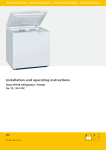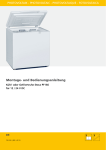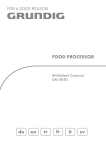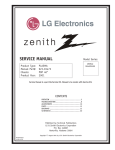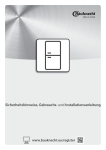Download Installation and operating instructions
Transcript
Installation and operating instructions Steca PF166 and PF240 refrigerator / freezer for 12 / 24 V DC EN 722.649 | Z03 | 11.28 ENGLISH Contents 1 About this manual.....................................................................................3 1.1Applicability.......................................................................................... 3 1.2Users..................................................................................................... 3 1.3 Description of symbols.......................................................................... 3 2Safety.........................................................................................................4 2.1 Dangers during installation and commissioning................................... 4 2.2 Exclusion of liability.............................................................................. 4 3 Disposal instructions.................................................................................5 4 Device and features overview....................................................................5 5Installation.................................................................................................6 6Connection.................................................................................................6 6.1 Direct connection to the battery........................................................... 7 6.2 Connection to a charge controller with deep discharge protection...... 7 7 Operating the device.................................................................................7 7.1 Switching the device on / off................................................................ 7 7.2 Setting the temperature....................................................................... 7 7.3 Temperature alarm................................................................................ 8 8 Menu functions..........................................................................................8 8.1 Setting the brightness........................................................................... 8 8.2 Setting the display of Celsius / Fahrenheit............................................. 8 8.3 Setting refrigerator / freezer mode....................................................... 8 9 Power outage display ...............................................................................9 10 Notes on freezing and storage..................................................................9 11Features...................................................................................................10 11.1Baskets................................................................................................ 10 11.2Lock.................................................................................................... 10 11.3 Freezer tray (depending on features).................................................. 10 11.4 Cold-storage accumulators (depending on options)........................... 10 12 StopFrost system.....................................................................................11 13Defrosting................................................................................................11 13.1 Freezer function.................................................................................. 11 13.2 Refrigerator function.......................................................................... 11 14Cleaning...................................................................................................11 15Faults........................................................................................................12 16Decommissioning....................................................................................12 17 Technical data..........................................................................................13 17.1 Electrical data..................................................................................... 13 17.2 Device data......................................................................................... 13 17.3 Power consumption............................................................................ 14 18Certificates...............................................................................................15 2 722.649 | 11.28 ENGLISH 1 About this manual 1.1Applicability This manual describes the installation, commissioning, function, operation, maintenance and deinstallation of the refrigerator / freezer. When installing the remaining components, e.g. the photovoltaic modules, the cabling, and other accessories, be sure to observe the appropriate installation instructions provided by each manufacturer. 1.2Users Installation, commissioning, maintenance and deinstallation of the refrigerator / freezer may only be done by trained personnel in accordance with the applicable on-site installation regulations. The professional personnel must be familiar with this operating manual and follow the instructions contained herein. 1.3 Description of symbols 1.3.1 The structure of the warning notices Pictogram with corresponding warning symbol SIGNAL WORD Type, source and consequences of the danger! XX Measures for avoiding danger 1.3.2 Danger levels in warning notices Danger level DANGER WARNING CAUTION CAUTION imminent threat of danger Consequences resulting from non-compliance death, serious bodily injury possible threat of danger death, serious bodily injury possible threat of danger minor bodily injury possible threat of danger property damage Probability of occurrence 1.3.3Notes NOTE Note on easier and safer working habits. XX Measures for easier and safer working habits 1.3.4 Other symbols and markings Symbol – • Emphasis on issue at hand 722.649 | 11.28 Meaning call to action result of action action description list emphasis on issue at hand 3 ENGLISH 2Safety 2.1 Dangers during installation and commissioning The following dangers exist during installation / commissioning of the refrigerator / freezer and during operation (in case of installation errors): • To avoid personal and material damage, the device should be unpacked and installed by two people. • If the device is damaged, contact the supplier immediately – before connection. • To ensure safe operation, only install and connect the device according to the information in the operating instructions. • If a fault occurs, immediately remove power from the device. Remove the fuse and disconnect the battery or pull the power plug. • Only allow trained personnel to perform repairs and other internal work on the device, otherwise this may result in significant danger for the users. • Do not bring open flames or other ignition sources into the internal spaces of the device. Ensure that the cooling circuit is not damaged when transporting and cleaning the device. In case of damage, keep ignition sources away and ventilate the room well. • This device is not intended for persons (or children) with physical, sensory, or mental disabilities, or who have inadequate experience and knowledge, unless they are instructed in the use of the device, or initially supervised, by a person responsible for their safety. Children should not be left alone with the device, to ensure that they do not play with it. • Avoid long-term skin contact with cold surfaces or cooled / frozen products. This can lead to pain, numbness and freezing. Wear protective clothing, e.g. gloves, when longer skin contact is unavoidable. • Do not immediately consume ice cream, especially frozen drinks and ice cubes, after removal or while they are still too cold. The low temperatures can present a "burn danger". • Do not consume food that has been stored for too long, it can lead to food poisoning. • The device is intended for cooling and freezing food and for the preparation of ice products. It is conceived for household use. The applicable commercial regulations must be observed when the device is used in a commercial environment. • The appliance is designed for use in enclosed areas. Do not operate the appliance outdoors or in areas where it is exposed to splash water or damp conditions. • For lockable devices, do not store the key near to the device or within the reach of children. • Do not store explosive substances or spray cans with inflammable materials, such as propane, butane, pentane etc., in the device. Escaping gases can be ignited by electrical components. These types of spray can be recognized by the contents printed on the can or by a flame symbol. • Do not use electrical equipment within the device. • The appliance is not suitable for operation in potentially explosive atmospheres. 2.2 Exclusion of liability The manufacturer cannot monitor the compliance to this manual as well as the conditions and methods during the installation, operation, usage and maintenance of the refrigerator / freezer. Improper installation of the system may result in damage to property and, as a result, in bodily injury. Therefore, we assume no responsibility and liability for loss, damage or costs which result or are in any way related to incorrect installation, improper operation and incorrect use and maintenance. Similarly, we assume no responsibility for patent right or other right infringements of third parties caused by usage of this refrigerator / freezer. The manufacturer reserves the right to make changes to the product, technical data or assembly and operating instructions without prior notice. XX As soon as it becomes evident that safe operation is no longer possible (e.g. if there is visible damage), remove the device from the power supply immediately. 4 722.649 | 11.28 ENGLISH 3 Disposal instructions The packaging is made from recyclable materials. • Corrugated cardboard / Cardboard • Moulded polystyrene parts • Polyethylene plastic • Polypropylene reinforcing straps WARNING Packaging material is not a toy for children – danger of suffocation from plastic! XX Bring the packaging to an official recycling centre. The worn out device: The device still contains valuable materials and is not to be disposed of in the normal household waste. • Render worn out devices unusable. Pull the power plug, cut the power cable and make the lock unusable to prevent children from locking themselves inside. • Ensure that the cooling circuit of the worn out device is not damaged when being transported to prevent uncontrolled escape of the refrigerant it contains (data on type plate) and oil. • Information on the coolant used is on the type plate. • Worn out devices must be professionally disposed of in accordance with local regulations and legislation. 2 6 8 4 7 4 1 Device and features overview Temperature adjustment button (Up / Down) On / Off button Alarm-off button (Alarm) Temperature display °C 3 5 Temperature display °F 1 Menu button for configuration (Menu) Digital temperature display Minus display 1 Operating and monitoring element 2 Type plate 6 Motor space ventilation grill Condensation water outflow (external) 5 Condensation water outflow (internal) and plug 3 Lock 4 NOTE Be sure to close the condensation-water outflow opening in the base of the device! XX Be sure to close the condensation-water outflow opening in the base of the device using the plug provided before commissioning the device! This is important for proper functioning of the device. 722.649 | 11.28 5 ENGLISH 5Installation • Avoid installation locations in direct sunlight, or next to stoves, heating, or similar heat sources. • The floor at the installation location should be level and flat. Install the device a sufficient distance from the wall so that the lid can open and close unhindered. • Do not cover the gap between the lower edge of the cabinet and the floor, because the chiller must be provided with cooling air. • The minimum clearance between the ventilation grill and the wall is 20 cm . This clearance must always be maintained and the ventilation grill must not be covered. • Do not obstruct the outer cladding of the device. A minimum all-round clearance of 20 mm must be maintained to ensure adequate heat dissipation. • According to the EN 378 standard, the installation room for the device must have a volume of 1 m³ per 8 g of R 134a coolant, so that if a leak develops in the cooling circuit no inflammable gas-air mixture can result in the installation room. Information on the coolant volume can be found on the type plate. • Do not connect the device together with other devices using an extension cable – danger of overheating. • Take note of the cable cross-section information in the table below when extending the power cable. 12 V Cable length Cable sizes 24 V Cable length Cross-section AWG mm² Gauge m ft. m ft. 2.5 12 2.5 8 5 16 4 12 4 13 8 26 6 10 6 19.5 12 39 6Connection The power type and voltage at the installation location must match the specifications on the type plate. The type plate is located on the upper right side wall of the cabinet. WARNING Risk of electrical shock and fire when connected to a voltage supply outside the specified range. XX The cable provided must be connected to a 12 V or 24 V DC connection at the battery or the charge controller. XX Please pay attention to the correct polarity: blue (−) and red (+). NOTES Energy saving XX Avoid long and unnecessary opening of the lid. XX Allow warm food to first cool to room temperature before storing it in the device. XX Defrost the device when an ice layer has formed. This improves the cooling transfer and reduces the energy consumption. Operation as refrigerator XX 6 If the device is used as a refrigerator (inside temperature above 0 °C / 32 °F), humidity will condense on the interior container. Drain condensed water periodically (see chapter 13 Defrosting). Do not store moisture-sensitive goods directly on the bottom of the refrigerator but in a basket or with distance to the bottom. 722.649 | 11.28 ENGLISH 6.1 Direct connection to the battery CAUTION The device does not function X Please pay attention to the correct polarity! The compressor is switched off by the integrated deep discharge protection, but the control unit remains in operation. The alarm sounds when the temperature increases (see chapter 7.3). NOTE Connection to the battery X Select this type of connection when you wish to give your device a high priority in the solar energy system, e.g. when you wish to cool / freeze critical products. 6.2 Connection to a charge controller with deep discharge protection CAUTION The device does not function X Please pay attention to the correct polarity! If the deep discharge protection of the charge controller completely switches off the cabinet power, then the control unit also receives no power. When the device is switched on again automatically, the integrated power outage display (see chapter 9) informs you of the internal temperature reached. NOTE Connection to a charge controller X 7 Select this type of connection when you wish to give your device the same priority as other loads in the solar energy system, e.g. when you wish to cool / freeze non-critical products. Operating the device 7.1 Switching the device on / off The device can be manually switched on or off using the button (On / Off). If the cabinet is switched off, the minus symbol flashes to indicate that the cabinet is still connected to the power. When the device is connected for the first time, it must be manually switched on by pressing the button (On / Off). On delivery, the device is set to cool (+8 °C | 46 °F). 7.2 Setting the temperature The standard internal temperature for normal operation is +8 °C | 46 °F. This value can be changed in the following manner. • The desired internal temperature is set by pressing the buttons (Up / Down). Pressing a button once causes the display to begin flashing. If the button is pressed again while the display is flashing, each button press increases / reduces the value by 1 °C | 1 °F. • If no button is pressed within a period of 5 seconds, the currently set value is adopted as the actual temperature. NOTE Adjustable temperature range X In refrigerator mode, temperatures from +2 °C | 36 °F to +12 °C | 54 °F can be set, and in freezer mode, temperatures from −10 °C | 14 °F to −20 °C | −4 °F can be set. 722.649 | 11.28 7 ENGLISH 7.3 Temperature alarm The temperature alarm helps to protect your cooled / frozen products and also helps to save energy. The alarm sounds when the internal space is not cold enough. The temperature display flashes at the same time, or when too much warm air enters the cabinet while sorting, placing, or removing food. Pressing the alarm-off button mutes the alarm. The temperature display continues to flash until the alarm state is over. 8 Menu functions The following functions can be set using the menu: • The display brightness • Temperature display in degrees Celsius or Fahrenheit • The use of the device as a refrigerator or freezer 8.1 Setting the brightness 1 XX Pressing the button (Menu) for 3 seconds brings you to the menu, the display (°F symbol) flashes and "b" is displayed. 2 XX Pressing the button (Menu) again causes a "1" to appear in the display. 3 XX The buttons (Up / Down) allow a brightness value of “1”, “2” or “3” to be selected. The higher the number, the brighter the display. 4 XX Once the desired brightness has been set, this has to be confirmed by pressing the button (Menu). Pressing the button (On / Off) returns you to the standard mode. NOTE Energy saving XX The higher the brightness, the higher the power consumption. The factory setting “b1” is the power-saving mode. 8.2 Setting the display of Celsius / Fahrenheit 1 XX Pressing the button (Menu) for 3 seconds brings you to the menu, the display (°F symbol) flashes and "b" is displayed. 2 XX Pressing the button (Up) allows you to change from "b" to “”. 3 XX If you now press the button (Menu) then “°C” appears. 4 XX The buttons (Up / Down) can now be used to select between “°C” and “°F”. 5 XX Once the desired value has been set, this is confirmed by pressing the button (Menu). Pressing the button (On / Off) returns you to the standard mode. 8.3 Setting refrigerator / freezer mode 1 XX Pressing the button (Menu) for 3 seconds brings you to the menu, display (°F symbol) flashes. 2 XX Pressing the button (Up) causes ““ to appear. 3 XX Pressing the button again causes “F” to appear. 4 XX Pressing the button (Menu) again causes “F “ to display. 5 XX The buttons (Up / Down) can now be used to select between refrigerator “F “ and freezer “F “. 6 XX Once the desired value has been set, this is confirmed by pressing the button (Menu). Pressing the button (On / Off) returns you to the standard mode. 8 722.649 | 11.28 Refrigerator Freezer ENGLISH 9 Power outage display If “PS” is shown in the display, this means that: A power interruption in the last hours or days has resulted in a temperature increase within the device. This can occur as a result of (e.g.) deep discharge protection (charge controller). If you press the alarm-off button while “PS” is displayed, then the display shows the highest temperature reached during the power outage. Depending on the level of warming or thawing, you should check the quality of the food and decide whether it can still be used, even when the cabinet has returned to the set temperature long after the power outage! This highest temperature is displayed for about one minute. The electronics then display the actual cooling / freezing temperature once more. 10 Notes on freezing and storage • Store the same types of cooled / frozen products together. • The following products are suitable for freezing: meat, game, poultry, fresh fish, vegetables, fruit, dairy products, bread, cakes and pastries, convenience food. • The following products are not suitable for freezing: Cabbage or lettuce, radishes, grapes, whole apples and pears, fatty meat. • Always pack food that you freeze yourself in household-sized portions. To ensure that the products quickly freeze to the core, the following quantities per package should not be exceeded: Fruit and vegetables up to 1 kg, meat up to 2.5 kg. • Blanch vegetables after washing and portioning (place in boiling water for 2 – 3 minutes, then remove and rapidly cool in cold water). • Do not salt or season fresh food and blanched vegetables before freezing. Other food should only be lightly salt and seasoned. Seasoning changes the taste intensity. • Commonly available freezer bags and reusable plastic, metal, and aluminium containers can be used for packaging. • Do not allow unfrozen food to come into contact with already frozen food. Always store dry packages to ensure that they do not freeze together. • Always label the packaging with date and contents and never exceed the recommended maximum storage time of the frozen products. • Do not freeze bottles and cans containing carbonated liquids. They may burst. • Only thaw the quantity that you currently actually require. Prepare thawed food as quickly as possible for consumption. 722.649 | 11.28 9 ENGLISH 11Features 11.1Baskets The baskets make sorting easier. The upper baskets can be hung by the handle on the cabinet frame. The lower baskets stand on the floor of the device or on the inwardly pivoted handles of the lower baskets. Press the handle down, then lift and pivot inwards. Simply grasp the handle from above to remove the lower baskets. 11.2Lock The lock is equipped with a safety mechanism. Locking the appliance: 1 XX Press the button and keep it depressed. 2 XX Turn the key 90°. 2 11.3Freezer tray (depending on features) The freezer tray can either be suspended on the basket or can be slid into the interior container and used as a partition. The freezer tray allows you to gently freeze fruit (e.g. berries, fruit pieces), herbs and vegetables for garnishing. Loosely distribute the cooled / frozen products on the freezer tray (the fruit do not stick together and largely retain their original form). Allow to freeze for 10 to 12 hours, then pack into freezer bags or containers and store in a basket. You can also use the trays as partition walls. This allows you to create two different temperature zones. The freezer trays can also be used to catch condensation water. 11.4Cold-storage accumulators (depending on options) In the event of a power failure, the cold-storage accumulator delays the temperature increase in the freezer compartment. When switching on for the first time, insert the accumulator in direct contact with the interior container side walls and the interior container floor so that it freezes quickly. When the accumulator is completely frozen, position it at the top of the interior container. To do this, place the freezer tray containing the accumulator in one of the top baskets. If the freezer tray continues to be needed as a partition, place the accumulator in the basket directly on top of the frozen goods. 10 722.649 | 11.28 1 ENGLISH 12 StopFrost system The device has a new StopFrost system. This system significantly reduces the build up of frost , ice and condensation water so that defrosting is seldom necessary. The lid can also be immediately reopened after filling the device with cooled / frozen products, since the StopFrost system provides immediate pressure compensation once the lid is closed. Function: A connection is made between the internal and external environments via a dry cartridge foamed into the device lid. In normal devices, moist air is sucked in via the lid seals during the cooling phase, which leads to the formation of frost and ice over time. This moisture is taken in by the StopFrost system so that only dry air remains in the inner compartment. During pauses in the cooling process, the dry air flows outside once more, thus drying the dry cartridge. 13Defrosting 13.1Freezer function Over longer operating periods, a layer of frost and / or ice forms on the inner walls. This increases the energy consumption. Regular defrosting should be done for this reason. • Switch off the device for defrosting. Remove the fuse and disconnect the battery or pull the power plug. • Wrap the cooled / frozen goods in paper or blankets and store them in the baskets in a cool place. • Remove the partition wall or freezer tray and place it underneath the device so that the condensation water flows through the outflow opening and into the partition wall or freezer tray. Pull the condensation water plug from the outflow opening. • Leave the cabinet lid open during the defrosting process. Mop up any remaining condensation water with a cloth and clean the device. CAUTION: Never use a mechanical device or any other artificial aid for defrosting, other than those recommended by the manufacturer. 13.2Refrigerator function Depending on the humidity, water will condense on the interior container. The condensed water must be drained periodically. • Remove the partition wall or freezer tray and place it underneath the device so that the condensation water flows through the outflow opening and into the partition wall or freezer tray. Pull the condensation water plug from the outflow opening. • Mop up any remaining condensation water with a cloth and clean the device. NOTE XX Do not leave the condensation water plug removed permanently. Otherwise humidity will flow into the device and will condense inside. 14Cleaning Always switch the device off before cleaning. Remove the fuse and disconnect the battery or pull the power plug. Clean the inner compartment, accessories, and outer walls with warm water and a small amount of detergent. Never use cleaning agents containing sand or acidic chemical solvents. CAUTION Danger of damage and personal injury. XX Do not use steam cleaning devices! • Ensure that no cleaning water penetrates into the electrical components or the ventilation grill. • Thoroughly dry everything with a cloth. • The inlet and exhaust grills must be regularly cleaned. Dust deposits increase the energy consumption. Ensure that no cables or other components are torn off or damaged. 722.649 | 11.28 11 ENGLISH 15Faults Your device is designed and manufactured for a long, fault-free, operating life. If it seems as if a fault has appeared during operation, please check whether this is perhaps due to an operating error, since you must pay for any costs incurred if the fault was caused by an operating error, even in the warranty period. You can resolve the following faults yourself by isolating the possible causes: XX XX XX XX The device does not work, the display is completely switched off, even the minus sign does not flash: Check ZZ the correct polarity of the power connection ZZ the fuse in the power cable of the device ZZ the battery cables The device makes too much noise: Check ZZ whether the device stands securely on the floor ZZ whether neighbouring furniture or objects are being set in vibration by the running coolant compressor. Note that flow noises within the cooling circuit cannot be avoided. The temperature is not low enough: Check ZZ the settings in the "Setting the temperature" section ZZ whether the correct values have been set ZZ whether the battery voltage is perhaps too low ZZ whether excessively large quantities of fresh food have been stored; check the display again in 24 hours ZZ whether a separate thermometer (not included) shows the correct value ZZ whether the installation location is close to a heat source F4 appears in the display: ZZ A fault may have developed in the temperature sensor. The device continues to operate in emergency mode. Avoid opening the lid too frequently or for too long. Please contact your specialist dealer. If none of the abovementioned causes exist and you cannot resolve the problem yourself, then please contact your specialist dealer. Provide them with the type designation, index and device number shown on the type plate. The type plate is located on the upper right side wall of the cabinet. Keep the cabinet lid closed if a fault develops. This delays the loss of cooling, the temperature increase, and a possible defrosting. 16Decommissioning If the device is to be placed out of operation for a long period of time: Switch off the device, remove the fuse and disconnect the battery or pull the power plug. Clean the device and leave the cabinet lid open to avoid the formation of odors. The seal integrity of the cooling circuit should be checked. The device has RF suppression in accordance with EN 55014, which reflects the EC regulation 2004/108/EEC. The manufacturer is continually developing and improving all types and models. Please therefore understand that we must reserve the right to make changes in form, features, and technology. 12 722.649 | 11.28 ENGLISH 17 Technical data 17.1Electrical data Steca PF166/PF240 System voltage 12 V 24 V 10 V to 17 V 17 V to 31,5 V Deep discharge protection 10,4 V 22,8 V Automatic switch-on threshold 11,7 V Input voltage range Power consumption Recommended fuses 24,2 V 40 – 100 W 15 A 7,5 A 17.2Device data Steca PF166 Steca PF240 Energy efficiency class Cooling method A++ compressor yes Automatic energy-saving mode Energy optimized speed control Full digital and electronic control system Configurable Display yes digital temperature display in lid adjustable Celsius / Fahrenheit temperature display adjustable Display brightness Usable cooling volume 166 litre | 5,9 ft³ 240 litre | 8,5 ft³ adjustable Refrigerator or freezer function Adjustable internal temperature yes Refrigerator temperature range 2 °C | 36 °F – 12 °C | 54 °F Freezer temperature range Ambient temperature range −20 °C | −4 °F – −10 °C | 14 °F 10 °C | 50 °F – 43 °C | 109 °F 2 Hanging baskets 3 Freezer trays Lock yes Cold battery External dimensions A x B x C A C Weight 1 91,7 x 87,2 x 70,9 cm 36.1 x 34.3 x 27.9 inch 91,9 x 128,8 x 76 cm 36.2 x 50.7 x 29.9 inch 47 kg | 104 lbs 62 kg | 137 lbs B 722.649 | 11.28 13 ENGLISH 17.3Power consumption Steca PF166 Ambient temperature 20 °C 25 °C 30 °C 35 °C 40 °C Internal temperature +8 °C 44 Wh / day 72 Wh / day 109 Wh / day 156 Wh / day 216 Wh / day Internal temperature +3 °C 72 Wh / day 109 Wh / day 156 Wh / day 216 Wh / day 291 Wh / day Internal temperature −10 °C 190 Wh / day 259 Wh / day 346 Wh / day 454 Wh / day 589 Wh / day Internal temperature −20 °C 346 Wh / day 454 Wh / day 589 Wh / day 756 Wh / day 964 Wh / day Steca PF240 Ambient temperature 20 °C 25 °C 30 °C 35 °C 40 °C Internal temperature +8 °C 49 Wh / day 82 Wh / day 125 Wh / day 183 Wh / day 256 Wh / day Internal temperature +3 °C 82 Wh / day 125 Wh / day 183 Wh / day 256 Wh / day 351 Wh / day Internal temperature −10 °C 225 Wh / day 311 Wh / day 421 Wh / day 561 Wh / day 739 Wh / day Internal temperature −20 °C 421 Wh / day 561 Wh / day 739 Wh / day 964 Wh / day 1246 Wh / day 1300 Wh/d 1200 1100 1000 900 800 700 600 500 400 300 200 100 °C 0 20 22 24 26 28 30 32 34 Steca PF166 3 °C Steca PF166 8 °C Steca PF166 -10 °C Steca PF166 -20 °C 36 38 40 Fig. 1: Power consumption vs. ambient temperature at different internal temperatures (PF166) 1300 Wh/d 1200 1100 1000 900 800 700 600 500 400 300 200 100 °C 0 20 22 24 26 28 30 32 34 Steca PF240 3 °C Steca PF240 8 °C Steca PF240 -10 °C Steca PF240 -20 °C 36 38 40 Fig. 2: Power consumption vs. ambient temperature at different internal temperatures (PF240) 14 722.649 | 11.28 ENGLISH 18Certificates 722.649 | 11.28 15 722649

















